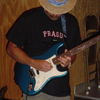Well, if you want to have a conversation you will probably need a vocabulary. The greater your vocabulary, the more in-depth conversations you will be able to have. Know 100 words and you can talk to preschoolers, know 100,000 words and you can talk to astrophysicists. Music is the same way. If you only want to hang out with 3 chord players in one key, your needs are simple. If you want to jam with Herbie Hancock, Van Morrison, or do session work you probably want to know all your chords and scales. How much you need depends on how far you wanna go. It really isn't all that difficult. There are only 12 notes and they are all in the key of C... It's just that the devil is in the details.
I jammed with friends this weekend and the other guitarist who actually has a pretty good ear says "I only know how to solo in A." Really? Just in A??
I jammed with friends this weekend and the other guitarist who actually has a pretty good ear says "I only know how to solo in A." Really? Just in A??
Cajundaddy





